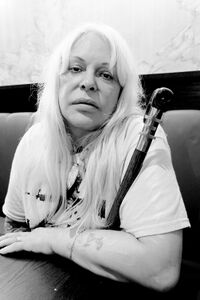Genesis P-Orridge

Relevance
Mentioned In
Discogs Information
Profile
British singer/songwriter, musician, writer, and artist. (use new identity Genesis Breyer P-Orridge for releases credited so.)
Born: 22 February 1950 in Manchester, England, UK. Died: 14 March 2020 in NYC, New York, USA (aged 70).
Neil Andrew Megson legally changed their name by deed poll to Genesis P-Orridge on 5 January 1971.
With band COUM Transmissions they challenged social boundaries with art; with Throbbing Gristle they played a part in fundamentally redefining music; as the core of Psychic TV they brought this challenge to the mainstream, becoming influential on the dance music sub-culture in the UK.
They courted controversy with pictures of piercings in the RE:Search book "Modern Primitives"; experimental video projects led to an eight-year exile from the UK; and a near-death experience led to engaging in extreme body modification, along with new wife Lady Jaye, to become the 'pandrogyne'.
In 2003, Genesis P-Orridge changed identity to Genesis/Djin Breyer P-Orridge.
External Links
- https://www.discogs.com/artist/22533-Genesis-P-Orridge
- https://en.wikipedia.org/wiki/Genesis_P-Orridge
- https://theearchive.bandcamp.com
Wikipedia Information
 |
Genesis Breyer P-Orridge (born Neil Andrew Megson; 22 February 1950 – 14 March 2020) was an English singer-songwriter, musician, poet, performance artist, visual artist, and occultist who rose to notoriety as the founder of the COUM Transmissions artistic collective and lead vocalist of seminal industrial band Throbbing Gristle. They were also a founding member of Thee Temple ov Psychick Youth occult group, and fronted the experimental pop rock band Psychic TV. Born in Manchester, P-Orridge developed an early interest in art, occultism, and the avant-garde while at Solihull School. After dropping out of studies at the University of Hull, they moved into a counter-cultural commune in London and adopted Genesis P-Orridge as their pseudonym. On returning to Hull, they founded COUM Transmissions with Cosey Fanni Tutti, and in 1973 they relocated to London. COUM's confrontational performance work, dealing with such subjects as sex work, pornography, serial killers, and occultism, represented a concerted attempt to challenge societal norms and attracted the attention of the national press. COUM's 1976 Prostitution show at London's Institute of Contemporary Arts was particularly vilified by tabloids, gaining them the moniker of the "wreckers of civilisation." P-Orridge's band, Throbbing Gristle, grew out of COUM, and were active from 1975 to 1981 as pioneers in the industrial music genre. In 1981, P-Orridge co-founded Psychic TV, an experimental band that from 1988 onward came under the increasing influence of acid house. In 1981, P-Orridge co-founded Thee Temple ov Psychick Youth, an informal occult order influenced by chaos magic and experimental music. P-Orridge was seen as the group's leader, but rejected that position, and left the group in 1991. Amid the Satanic ritual abuse hysteria, a 1992 Channel 4 documentary accused P-Orridge of sexually abusing children, resulting in a police investigation. P-Orridge was subsequently cleared and Channel 4 retracted their allegation. As a result of the incident, P-Orridge left the United Kingdom for the United States and settled in New York City. There, they married Jacqueline Breyer, later known as Lady Jaye, in 1995, and together they embarked on the Pandrogeny Project, an attempt to unite as a "pandrogyne", or single entity, through the use of surgical body modification to physically resemble one another. P-Orridge continued with this project of body modification after Lady Jaye's 2007 death. Although involved in reunions of both Throbbing Gristle and Psychic TV in the 2000s, they retired from music to focus on other artistic media in 2009. P-Orridge was credited on over 200 releases during their lifetime. They were cited as an icon within the avant-garde art scene, accrued a cult following, and had been given the moniker of the "Godparent of Industrial Music". P-Orridge considered themself third-gender and used various gender-neutral pronouns.
Related Forum Threads
- [Morrissey Central] "Being Dead Changes You" by Morrissey (April 22, 2020) - Morrissey-solo (Apr 22, 2020)